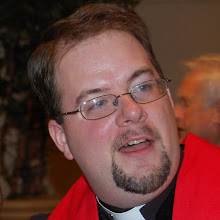So, there are a number of folks out there looking for a deeper interpretation of The Dark Knight than just an entertaining advancement of the Batman epic. Sojourners and The Wall Street Journal both offer up their perspectives as they relate to the War on Terror and George W. Bush.
But the hunt for a scapegoat in The Dark Knight hinges upon real wrongs done to real people--some deserving, some not--by the morally-troubling-turned-physically-and-psychologically-damaged Harvey Dent.
Sojourners wants the ending of the movie to be about our hunt for a scapegoat for all of our sins. The WSJ wants the ending to be about the inevitable blameshifting onto a worthy cause. But neither of those are the case. It is about the individuals with real power choosing to create a lie so that something greater doesn't die.
Both Sojo & the WSJ speak of this action as it is inevitable. But it isn't. Gordon has to forego his only real friend (!?) and partner while Batman is pushed further underground and anti-establishment even as he tries to preserve his real work. But it is a choice: not to reveal that Harvey Dent was pushed off the cliff by the horrific violence done against him and Rachel Dawes, and all its collateral damage in the soul.
Of course, one doubts that Gotham City could have understood the truth about Harvey Dent any more than they could understand how close they truly are to moral and social evil (see the ferrboat scene for an excellent example of the precipice). Gordon & Batman know precisely how close to the edge (or over it) Gotham is, which is why they opt for what they believe is the lesser of two evils. But don't mistake it--perpetuating/creating a lie instead of the truth is indeed an evil, no matter how lesser it may be. I don't doubt that Chris Nolan will make good use of this in his 3rd movie to explore the deep ramifications of good people choosing the fictious over veracity. (Chris, if you want help, watch Frodo's assistance of Gollum's descent after the waterfall scene in The Lord of the Rings.)
At the end of the day, what the movie portrays is a choice that has consequences. The scapegoating by the good citizens of Gotham--for whatever reason--is enabled by what Gordon & Batman choose to do. And this is the heart of the Christian story: that the sin which inhabits our world is there because of a choice we have made. It is no one else's fault but our own. Accepting a gracious forgiveness & freedom from God does not, unfortunately, mitigate the consequences of our actions. Batman's freedom to make a decision to save either Rachel or Harvey leads to diasterous consequences which set the endgame in motion: he must now think that the other option would have been the best. Human freedom is always hampered by finitude, if not by sin, even divinely granted human freedom. The Dark Knight is an excellent exploration of moral complexity and the dialectic between freedom and sin, which the Christian tradition knows all too well.
The quiet rise of Christian dominionism
-
Jerry Falwell wanted to prepare America for the end of the world. Ted
Cruz’s evangelical backers want to take America over.
3 years ago






No comments:
Post a Comment